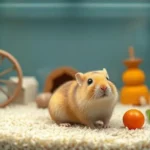Gerbils are social, low maintenance, and crazy funny, making them a great pet for families, individuals and even beginners. You will keep yourself engaged by their curious nature and adorable habits like burrowing and chewing.
Gerbils might be as resilient as their own name suggests, but that doesn’t make them crazy hardy. A well structured care checklist can keep your gerbils happy and stay healthy.
There are things to be considered before bringing a gerbil home into your life. An essential checklist will help you organize all the must have supplies, establish some comfortable habitat and develop some feeding, cleaning and bonding routines.
New owners will really appreciate this guide, as it will help reduce stress and get you and your gerbil off on the right foot.
Preparing for Your Gerbil
Selecting Your Gerbil
Where to Buy or Adopt
The best way to get your gerbil is from reputable pet stores, breeders and rescue organizations. Find areas with good clean environments and healthy animals. Gerbils are social, and if possible, adopt pairs or groups.
Choosing a Healthy Gerbil
Check out the animals for shiny fur, bright eyes, and moving around. Steer clear of gerbils that seem drowsy or have visible injuries or anything else amiss, from discharge from the nose or eyes.
Essential Supplies Checklist
1. Enclosure
A gerbil should be kept in a glass tank with a secure mesh lid that is the ideal home. A tank is better than wire cages because the bedding won’t be scattered, and the borer has a better environment. Two gerbils will live in a 20 gallon tank.
2. Bedding
Burrow bedding can be aspen or paper based and burrow bedding for comfort. Also avoid pine or cedar bedding as the oils contained in the wood can damage your gerbil’s respiratory system.
3. Nesting Materials
There are provide soft unbleached paper or hay for nesting. This is how your gerbil will have a space to rest.
4. Food and Water Accessories
- A ceramic food dish that’s hard to tip over.
- To guarantee continuous access to fresh water, use a water bottle with a sipper tube.
5. Toys and Chewables
To keep you gerbil entertained and their teeth healthy, you need chew toys, tunnels, and wooden blocks.
6. Exercise Wheel
Using a solid surface exercise wheel will keep your gerbil active, but helps avoid injury. Make sure their small stature can fit into the wheel.
Also read: How To Take Care Of A Gerbil?
Setting Up the Habitat
Tank Size and Placement

Your gerbil’s tank should be spacious enough to accommodate burrowing, playing, and nesting. A pair of gerbils would do well in a 20-gallon tank. Place the tank in a quiet, temperature-controlled area, away from direct sunlight and drafts. Avoid noisy spots to minimize stress.
Creating a Comfortable Environment
- Layering Substrate: Add at least 6–8 inches of bedding to allow natural burrowing behaviors.
- Hiding Spaces: Include hideouts like wooden houses or small cardboard boxes to make your gerbil feel secure.
- Climbing Opportunities: Use ladders or climbing branches to stimulate natural behaviors.
Maintenance Tips
Cleaning Routine
Spot-clean the tank weekly, removing soiled bedding and uneaten food. Every 3–4 weeks, perform a full clean by replacing all bedding and wiping down the tank with a pet-safe cleaner.
Managing Odors
Gerbils are naturally clean animals, so odor issues are minimal. However, consistent cleaning and avoiding overly moist environments will prevent unpleasant smells.
Feeding Your Gerbil

Feeding your gerbil the right diet is crucial to their health and happiness. Gerbils are omnivores, and their nutritional needs are simple yet specific. This is all the information you require regarding their diet.
Balanced Diet
The foundation of your gerbil’s diet should be high-quality gerbil pellets. These pellets ensure your pet gets the necessary vitamins, minerals, and nutrients without picking out their favorite bits and leaving the rest.
Fresh Foods: Supplement their pellets with small amounts of fresh vegetables like carrots, cucumber, and broccoli. Occasionally, you can offer fruits like apple or pear, but only in moderation as the sugar content is high.
Treats: Treats are a fun way to bond with your gerbil. Options like pumpkin seeds, unsalted nuts, and dried mealworms are great choices. However, keep treats limited to avoid obesity or an imbalanced diet.
Feeding Guidelines
Gerbils typically eat 1–2 tablespoons of food daily. Provide a fresh serving each day and remove uneaten perishable items to prevent spoilage. Scatter feeding can also encourage natural foraging behavior.
Water Needs
Ensure your gerbil has constant access to fresh water. A water bottle with a sipper tube is ideal because it prevents spillage and contamination. Check daily to ensure the bottle isn’t clogged.
Handling and Socializing
Gerbils are naturally curious and social animals. Building trust and bonding with your pet requires patience and the right techniques.
Bonding With Your Gerbil
Start by spending time near their enclosure, speaking softly to help them get used to your presence. Offer treats through the tank or on your hand to build trust. Avoid sudden movements that could scare them.
Steps to Hand-Taming:
- Lay your hand flat inside the tank and allow the gerbil to sniff you.
- Once comfortable, they may climb onto your hand.
- Gradually begin to lift them slightly off the ground, ensuring they feel secure.
Understanding Social Behavior
Gerbils are highly social and thrive in pairs or small groups. Never keep a gerbil alone, as isolation can lead to stress and health issues. When introducing new gerbils, use the split-cage method to ensure a smooth transition. Watch for signs of aggression, such as biting or chasing.
Safe Handling Practices
Always scoop your gerbil from below rather than grabbing them from above, as this mimics a predator’s attack. Support their body securely, and avoid squeezing them. Children should be supervised during handling to ensure the gerbil’s safety.
Health and Wellness
Your gerbil’s health is a key part of their overall well-being. By monitoring for signs of illness and maintaining a clean environment, you can help your pet live a long and happy life.
Common Health Problems
Gerbils are generally hardy animals, but they can still face health challenges. Here are some common issues:
- Dental Problems: Overgrown teeth can cause eating difficulties. Provide chew toys to keep their teeth in check.
- Injuries: Scrapes or fractures can occur, especially in overly active environments.
- Respiratory Issues: Wheezing or labored breathing may indicate illness, often caused by unsuitable bedding or a dusty environment.
Watch for signs like weight loss, lethargy, fur loss, or changes in behavior. Early detection is crucial to effective treatment.
Vet Care Tips
Not all veterinarians specialize in small animals, so locate an exotic pet vet in your area before you need one. Annual check-ups and addressing concerns promptly will keep your gerbil in top shape.
Gerbil Enrichment and Playtime
Gerbils are highly intelligent, curious creatures that need plenty of mental stimulation and physical activity to stay happy and healthy. Providing enrichment through toys, tunnels, and supervised playtime will keep your gerbil active and engaged.
Importance of Mental Stimulation
Gerbils are natural foragers, burrowers, and explorers. Without proper enrichment, they can become bored and stressed, which may lead to behavioral issues or health problems. Offering a variety of toys and activities will help them burn off energy and satisfy their instincts.
Toys and Chewables
Providing chew toys is essential for your gerbil’s dental health. Wooden blocks, cardboard tubes, and untreated wicker baskets are perfect for gnawing. Rotate toys regularly to keep their environment fresh and interesting. You can also hide treats inside tunnels and cardboard boxes to encourage natural foraging.
Supervised Play Outside the Cage
Allowing your gerbil to explore outside the cage can be a fun bonding experience, but it’s important to supervise them at all times. Set up a safe, enclosed space where they can roam freely without the risk of injury or getting lost. Be mindful of small objects or hazards like wires that could pose a danger to your pet.
FAQs
How much space do gerbils need?
For two gerbils, a 20-gallon tank is the bare minimum, but bigger is always preferable. They require lots of space to play, dig, and explore. A well-sized tank will help reduce stress and encourage natural behaviors.
What should I feed my gerbil?
A balanced diet of high-quality gerbil pellets should make up the bulk of their diet. You can supplement this with small amounts of fresh vegetables (like carrots and cucumber) and occasional fruits (like apples). Don’t forget about treats, but offer them in moderation.
How often should I clean the cage?
You should spot-clean the cage at least once a week, removing soiled bedding and uneaten food. Perform a full cleaning every 3–4 weeks, replacing all bedding and sanitizing the tank. This will stop odors and help keep the area hygienic.
Can gerbils live alone?
Gerbils are highly social animals and should not be kept alone. They should ideally be kept in small groups or pairs. If you must keep a single gerbil, make sure to spend plenty of time with them for companionship.
How do I tame a shy gerbil?
Patience is key when taming a shy gerbil. Start by sitting near their enclosure, speaking softly to them. Offer treats through the bars of the tank, and gradually introduce your hand. They will eventually grow accustomed to you and might even climb up on your hand.
Conclusion
Caring for a gerbil can be a fun and rewarding experience when you provide the proper environment, diet, and attention. By following the gerbil care checklist, you’ll create a happy and healthy home for your new pet. Remember to:
- Set up a spacious and safe habitat
- Provide a balanced diet and fresh water
- Spend time bonding and providing enrichment
- Stay on top of health and wellness to prevent problems
Your gerbil will flourish with the correct care and attention, adding happiness and company to your life. Enjoy the process of getting to know your pet and watching them grow and explore their world!











